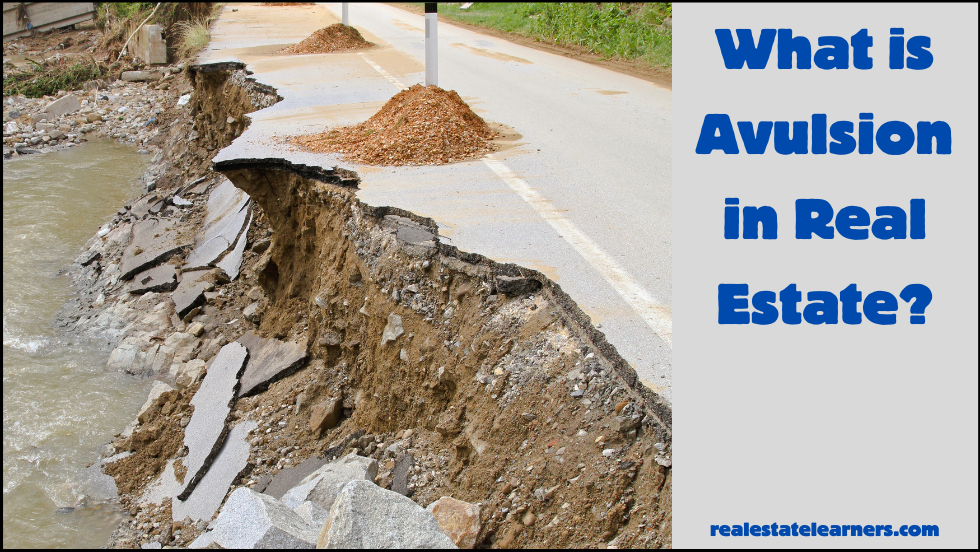In real Estate many individuals do not know what Avulsion is and how it can affect their property. Avulsion is an important term in real estate law that refers to the sudden and unexpected loss or addition of land, typically caused by natural events. In this post we will dive deeper into what Avulsion is, how it can impact your property and what you can do to protect yourself.
What is Avulsion in real Estate?
Avulsion definition real estateis defined as the sudden and perceptible loss or addition of land by the action of water or other natural forces. This means that any changes to a property caused by natural phenomena, such as a river changing its course or a landslide, would be considered Avulsion.
Explanation
Avulsion is a term that comes up often in real Estate and refers to the sudden removal of land or property. This can occur due to natural causes such as flooding, earthquakes, or erosion, or it can be caused by human actions such as construction projects or accidents.
Regarding real estate law, Avulsion is an important concept to understand as it can significantly impact property ownership and rights. In this article, we will discuss the definition of Avulsion, its different forms, and how it can affect real estate transactions.
What is the Example of Avulsion?
Example 1. Suppose a river overflows its banks and washes away a portion of land from a property owner’s land. This would be considered Avulsion as it is a sudden loss caused by the natural force of the river.
Example 2. A tree on one property falls onto another property during a storm, causing damage to the second property. This would also be considered Avulsion as it is a sudden and perceptible loss caused by natural forces.
Different Forms of Avulsion
There are two main forms of Avulsion: sudden Avulsion and gradual Avulsion.
Sudden Avulsion occurs when there is a rapid, noticeable change to the property due to natural causes. This can include events like floods, earthquakes, or landslides.
Gradual Avulsion, on the other hand, happens over time and is not as easily perceptible. This can include erosion or changing water levels that slowly alter the land.
What is the impact of Avulsion in real Estate?
Changes to Property Boundaries: Avulsion can cause changes to property boundaries, as the sudden loss or addition of land can alter the original boundaries. This can be particularly problematic if there are disputes over property lines.
Affects Property Value: The impact of Avulsion on property value can vary depending on the extent of the damage and location. In some cases, it may decrease the value; in others, it may increase if the change is beneficial (e.g., creating waterfront property).
Property Rights: In some cases, Avulsion can affect property rights, such as easements or access to waterways. If a natural event causes a change to these rights, it may require legal action to resolve.
Title Issues: Avulsion can also create title issues, as property boundaries or rights changes may not be reflected in the property’s title. This can lead to legal disputes and complications with real estate transactions.
Insurance Coverage: Property owners should review their insurance policies to understand if Avulsion is covered and what type of natural events are included. In some cases, additional coverage may be necessary to protect against potential losses from Avulsion.
Disclosure Requirements: Depending on the jurisdiction, sellers may be required to disclose any known avulsion events on a property. It is important for buyers to be aware of potential risks or changes to the property they are purchasing.
Legal Considerations: In cases of Avulsion, legal action may be necessary to resolve disputes over property boundaries or rights. Property owners need to understand their legal rights and responsibilities in these situations.
What are the advantages of Avulsion in real Estate?
Investment Opportunities: In some cases, Avulsion can create new investment opportunities for real estate investors. For example, a sudden change in land boundaries may open up possibilities for development or construction projects.
Potential for Increased Property Value: As mentioned earlier, Avulsion can sometimes increase property value if the changes are beneficial (e.g., creating waterfront property). This can be advantageous for property owners looking to sell or investors looking to purchase.
Negotiation Power: Avulsion events can create opportunities for negotiation between adjacent property owners. For example, suppose a sudden loss of land occurs on one owner’s property. In that case, the neighboring owner may have an opportunity to negotiate for additional land or rights over the affected area.
Risk Management: Understanding the potential risks of Avulsion can help property owners better manage and mitigate these risks. This may include taking precautions such as purchasing additional insurance coverage or regularly reviewing property boundaries.
Preservation of Historic Sites: In some cases, gradual Avulsion can reveal artifacts or historic sites that were previously hidden. This can create opportunities for preservation and restoration efforts.
What is the difference between accretion vs Avulsion?
Accretion is the gradual and imperceptible change to land boundaries due to natural forces, such as sediment deposition. On the other hand, Avulsion is a sudden and noticeable change caused by natural events.
The added land becomes part of the original property owner’s land in accretion. In Avulsion, the lost or added land may become part of a different property owner’s land.
Accretion is often seen as a positive change to the property, while Avulsion can have both positive and negative impacts.
Unlike Avulsion, accretion does not typically cause disputes over property boundaries or rights.
Accretion and Avulsion can affect property value and sometimes require legal action. However, the legal processes for resolving these issues may differ.
Accretion is a slower and more continuous process than Avulsion, which is sudden and perceptible.
The laws governing accretion and Avulsion may vary depending on the jurisdiction.
What is the opposite of erosion in real Estate?
The opposite of erosion in real Estate would be deposition, which is when sediment or land is added to a property over time. This can occur through natural processes like accretion or human actions such as land reclamation projects.
While erosion causes a loss of land and deposition results in an increase, both erosion and deposition are important factors to consider in managing and developing real estate properties.
Deposits can positively impact property value, while erosion can cause concerns for stability and future development plans. Understanding the dynamics of both processes is crucial for property owners and investors to make informed decisions about their assets.
Regular surveys and monitoring of property boundaries can help identify any changes caused by erosion or deposition, allowing for proactive measures to be taken if necessary. Additionally, implementing erosion control measures can help mitigate potential damage and maintain the integrity of a property’s boundaries.
So, while erosion can hurt real Estate, deposition can provide opportunities for growth and development. Property owners must understand both processes and how they may affect their investments to make informed decisions and effectively manage their properties.
Conclusion
Avulsion is an important concept to understand in real Estate, as it can significantly impact property boundaries, value, and rights. Property owners should be aware of the different forms of Avulsion and how it may affect their properties. It is also crucial for buyers and investors to consider potential risks and advantages of Avulsion when making real estate decisions.
Avulsion real estate definition and the differences between Avulsion and accretion are discussed above. All parties involved in real estate transactions need to know about Avulsion to properly handle any potential issues.

Corey has over 15 years of experience as a real estate broker and educator. He is dedicated to providing valuable insights and guidance for those looking to enter the real estate industry.

